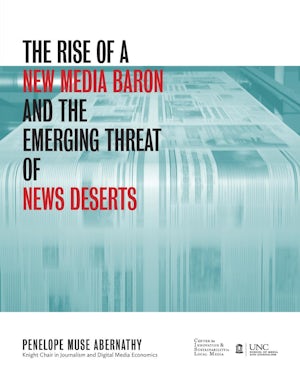


The decline of local news sources in the past two decades has led to the emergence of news deserts, leaving hundreds of counties in the US without any local news outlets. This has paved the way for new startups, but they are largely concentrated in areas with an already robust media landscape. The lack of local news has also contributed to a more polarized political landscape, as voters rely on national discourse and non-traditional media figures for news. As seen in the recent presidential election, digital content creators such as podcasters and social media influencers are gaining more viewership and influencing news consumption.
The Decline of Local News and the Rise of News Deserts
Background
Local news has long played a vital role in informing and connecting communities. However, in recent decades, the decline of local news sources has created a growing number of "news deserts," regions without any local news outlets. This decline has resulted from a combination of factors, including:
The Emergence of News Deserts
The decline of local news has led to the proliferation of news deserts, areas that lack local news coverage. According to a recent study by the University of North Carolina, nearly 200 counties in the United States do not have a single local newspaper. In these areas, residents rely on national news sources and social media for information, which can lead to a less informed and more polarized electorate.
The Rise of New Startups
In response to the decline of local news, new startups have emerged with the goal of providing local coverage. However, these startups tend to be concentrated in areas with an already robust media landscape, leaving many communities without access to local news.
The Impact on the Political Landscape
The lack of local news has also contributed to a more polarized political landscape. Without local sources to provide context and nuance, voters are more likely to rely on national discourse and non-traditional media figures for news. This has led to an increase in political extremism and a decline in civic engagement.
Top 5 FAQs and Answers
1. What is a news desert?
A news desert is an area that lacks local news coverage.
2. What causes news deserts?
News deserts are caused by a combination of factors, including consolidation of media ownership, technological changes, and lack of funding.
3. How many news deserts are there in the United States?
According to a recent study by the University of North Carolina, nearly 200 counties in the United States do not have a single local newspaper.
4. What is the impact of news deserts on communities?
News deserts can lead to a less informed and more polarized electorate, as well as a decline in civic engagement.
5. What can be done to address the decline of local news?
Addressing the decline of local news requires a multi-pronged approach, including increased public funding, support for independent journalism, and promoting media literacy.

During a speech for Deepotsav 2025 celebrations in Ayodhya, Uttar Pradesh Chief Minister Yogi Adityanath criticized the opposition for denying Lord Ram's existence and obstructing the Ram Janmabhoomi Temple movement. He specifically called out the Congress for submitting an affidavit to the Supreme Court calling Lord Ram a myth and accused the Samajwadi Party of firing bullets at Ram devotees. Adityanath also emphasized the determination and resilience of the movement, which began in 1949 with the resolution "Ram Lalla Hum aayenge, Mandir wahin banayenge" and continues to this day.

Activists and advocacy groups staged massive demonstrations across the country in response to what they see as President Trump's abuse of power. With signs protesting policies such as mass deportations and the federal government shutdown, protestors showed a fierce love for their country. Though there were no reports of violence or arrests, Republicans labeled the demonstrations as "hate America" rallies. Organizers estimate that nearly 7 million people participated in over 2,700 cities and towns throughout the U.S., making it one of the largest reported one-day protests in American history.

With the 2025 Assembly Elections in Bihar on the horizon, the state's Araria constituency is gearing up for an intense revision of its electoral roll. This decision by the Election Commission aims to ensure that all eligible citizens are registered to vote in the upcoming elections. In the last election, the Congress emerged victorious in the constituency, but with no candidates declared yet, all eyes are on the official schedule for the 2025 Bihar Assembly Elections.

The Bharatiya Janata Party (BJP) in Andhra Pradesh marked Dhanvantari Jayanti with a colorful rally and speeches highlighting social inclusion, cultural heritage, and development. Leading state and district leaders, including BJP State president PVN Madhav, addressed the gathering and emphasized the party's commitment to equal respect for all religions and welfare initiatives for marginalized groups. At another event, Telangana BJP president Ramachandra Rao endorsed a proposed reservation for backward classes in Telangana and criticized the Congress and other parties for corruption while touting BJP's claim of clean governance.

Defence Minister Rajnath Singh, while flagging off the first batch of BrahMos missiles in Lucknow, warned Pakistan that their entire territory is now within range of India's powerful missiles. Singh also highlighted the success of Operation Sindoor, stating that it was just a glimpse of India's growing capabilities. The minister emphasized that BrahMos serves as a symbol of India's strategic confidence and is a key pillar of the country's defence forces.

Crowds gathered in various cities across the US and overseas today for the No Kings rallies, organized to protest against President Trump's administration and to defend First Amendment rights. From Los Angeles and New York to Chicago, Washington D.C, and Austin, Texas, protesters marched and chanted, carrying homemade signs with messages such as "We want all of the government to work" and "Make America Good Again." Despite the festive atmosphere, the message was serious as speakers called for the protection of Constitutional rights, which they feel are being threatened by the current administration.

After issuing directions earlier this year to expedite the disposal of execution petitions, the Supreme Court has expressed disappointment over the fact that more than 8.8 lakh such petitions are still pending across the country. Despite disposing of 3.38 lakh petitions since March, the Court notes that the backlog is still concerning. It warns that delay in executing decrees could result in travesty of justice and directs the Karnataka High Court to provide an explanation for not submitting data on pending cases.

With election results just around the corner, the Union Home Minister has reiterated the BJP's respect for its alliance partners. The decision on forming a government in light of the election outcome will be based on the results and mutually agreed upon by all parties involved. Stay updated with News24 for the latest developments in the political sphere.

In a surprise move, President Donald Trump has commuted the sentence of former U.S. Representative George Santos, who was serving a seven-year prison term for fraud and identity theft. Santos, a New York Republican, admitted to deceiving donors and stealing the identities of 11 people, including family members, to fund his campaign. The decision was announced by Trump on social media, spurring strong reactions from both supporters and critics.

In a significant development, Defence Minister Rajnath Singh inaugurated Hindustan Aeronautics Limited's third production line for the LCA Tejas Mk1A and also witnessed the aircraft's successful maiden flight in Nashik. The event also marked the inauguration of HAL's second production line for the Hindustan Turbo Trainer-40 (HTT-40). With the approval of the purchase of 97 LCA Mark 1A fighter jets, the need for new inductions has been underlined by IAF chief AP Singh, while HAL officials remain confident in meeting this requirement.